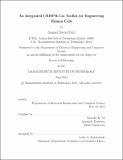An integrated CRISPR-Cas toolkit for engineering human cells
Author(s)
Perli, Samuel David
DownloadFull printable version (5.976Mb)
Other Contributors
Massachusetts Institute of Technology. Department of Electrical Engineering and Computer Science.
Advisor
Timothy K. Lu.
Terms of use
Metadata
Show full item recordAbstract
Natively functioning Clustered Regularly Interspaced Short Palindromic Repeats (CRISPR)-associated (Cas) system is a prokaryotic adaptive immune system that confers resistance to foreign genetic elements including plasmids and phages. Very recently, a two-component CRISPR-Cas technology from Streptococcus Pyogenes comprising of the RNA-guided DNA endonuclease Cas9 and the guide RNA (gRNA) has been demonstrated to enable unprecedented genome editing efficiency across all domains of life. Current applications however, employ CRISPR/Cas technology in a stand-alone fashion, isolated from the rich biological machinery of the host environment in which it is applied. In this thesis, I present a toolkit designed by integrating CRISPR/Cas technology with a wide array of mammalian molecular components, thereby enabling altogether novel applications while enhancing the efficiency of current applications. By integrating a catalytically dead version of the CRISPR/Cas protein Cas9 (dCas9) with mammalian transcriptional activator VP64 and mammalian transcriptional repressor KRAB, we build and characterize tunable, multifunctional and orthogonal CRISPR/Cas transcription factors (CRISPR-TFs) in human cells. By integrating CRISPR-TFs and Cas6/Csy4 based RNA processing with multiple mammalian RNA regulatory strategies including RNA Polymerase II (RNAP II) promoters, RNAtriple- helix structures, introns, microRNAs and ribozymes, we demonstrate efficient modulation of endogenous promoters and the implementation of tunable synthetic circuits such as multistage cascades and RNA-dependent networks that can be rewired with Csy4. In summary, our integrated toolkit enables efficient and multiplexed modulation of endogenous gene networks, construction of highly scalable and tunable synthetic gene circuits. Our toolkit can be used for perturbing endogenous networks towards developmental, therapeutic and synthetic biology applications.
Description
Thesis: Ph. D., Massachusetts Institute of Technology, Department of Electrical Engineering and Computer Science, 2015. This electronic version was submitted by the student author. The certified thesis is available in the Institute Archives and Special Collections. Cataloged from student-submitted PDF version of thesis. Includes bibliographical references (pages 145-158).
Date issued
2015Department
Massachusetts Institute of Technology. Department of Electrical Engineering and Computer SciencePublisher
Massachusetts Institute of Technology
Keywords
Electrical Engineering and Computer Science.